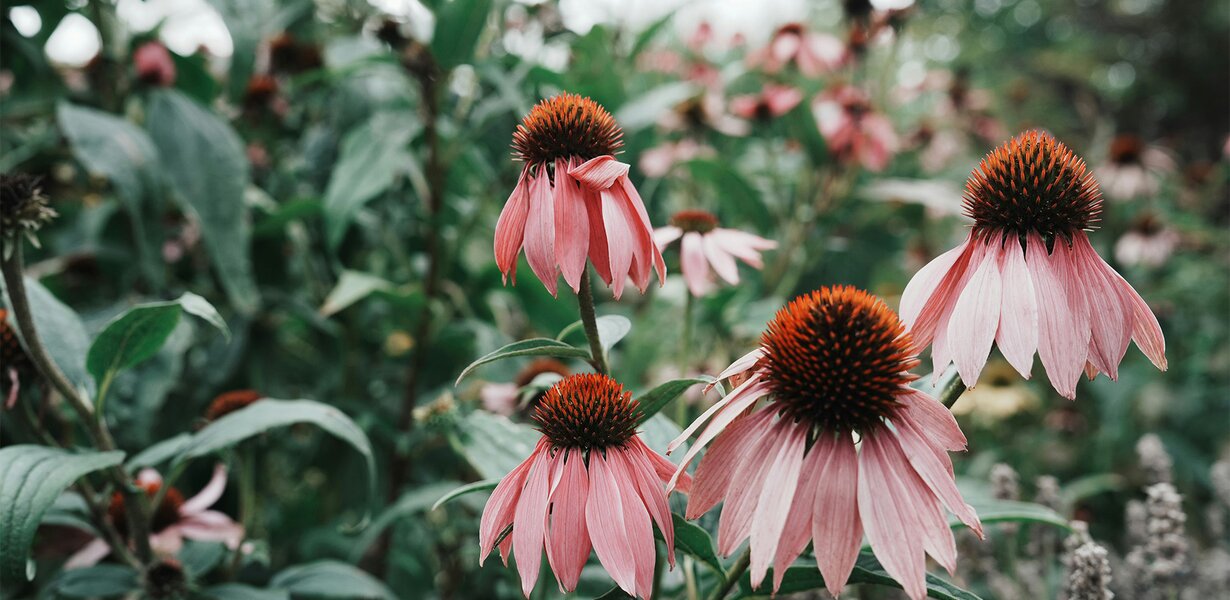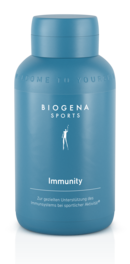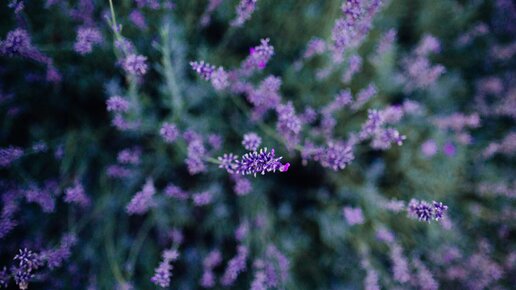Echinacea (coneflower) is a member of the daisy family and is full of flower power. The native peoples of North America were already aware of the healing properties of the wild plant native to their region. In the meantime, the immune-boosting flower has also made a name for itself in our latitudes. Join us today as we discover the colourful medicinal plant that is Echinacea.
What is Echinacea?
Echinacea, also known as coneflower, is a herbaceous perennial plant that is one of the most popular flowering garden plants due to its colourful flowers. The botanical name, Echinacea, is derived from the ancient Greek word for sea urchin (echinos), which alludes to the plant's flower basket, which resembles a small, rolled-up hedgehog. The English name ‘cone flower’ is also appropriate. During the flowering period, the flower basket is surrounded by magnificent ray florets, which, depending on the species, shine in colours ranging from the brightest pink to dark purple.
Origin
Echinacea originates from eastern and central North America. The indigenous tribes considered this member of the daisy family to be one of the most important medicinal plants, using it as a painkiller, for wounds and infections, among other things.
In Europe, echinacea was only known as an ornamental plant until the beginning of the 20th century. It was only gradually that knowledge of its valuable ‘flower power’ also became established here. In the meantime, echinacea is also cultivated in Europe as a herbal remedy.
Which is the best Echinacea among the different varieties?
Of the numerous species of the genus Echinacea, the following three are mainly used today for medicinal purposes:
- Red coneflower (Echinacea purpurea)
- Narrow-leaved coneflower (Echinacea angustifolia)
- Pale coneflower (Echinacea pallida)
In herbal medicine, however, it is mainly the red coneflower that has become established.
Ingredients
Echinacea owes its flowerpower not only to a single substance, but to the interaction of a wide variety of ingredients. Among the most interesting of these are alkamides, caffeic acid derivatives (cichoric acid), polyacetylenes and antioxidants such as flavonoids. In recent years, research has focused primarily on the alkamides contained in the plant, which have immunomodulatory and anti-inflammatory properties and appear to play a major role in the plant's specific effect.
Effects, uses and echinacea benefits
Echinacea strengthens the immune system
Nowadays, Echinacea is one of the most popular immune-boosting medicinal plants. Laboratory tests show that the daisy family can fight viruses, fungi and bacteria. In addition, Echinacea has been shown to have immunostimulatory and anti-inflammatory properties, as well as a regulating effect on the messenger substances of the immune system.
It was not until 2024 that a human study was published in which 80 volunteers took either 200 mg of echinacea extract or a placebo for eight weeks. After the end of the intake, the group that had taken echinacea showed an increase in resistance. Accordingly, echinacea can be recommended as a preventive measure, especially during the cold season, and for use in cases of colds, sore throats, flu-like infections and so on.
Echinacea may also be helpful for COVID-19
Echinacea could potentially have a positive effect on coronavirus disease due to its immunomodulating properties. Although there are currently no conclusive results regarding its therapeutic effects on COVID-19 or a cytokine storm, the available research results on the influence of the plant on cytokine levels suggest that further clinical studies with COVID-19 patients could be justified.
Echinacea may also be beneficial for the psyche
It seems that Echinacea does more than just boost the immune system. Initial indications suggest that the daisy family plant may also have a beneficial effect on mental health. Studies show that alkamides, caffeic acid and rosmarinic acid could alleviate anxiety. However, further research is needed before any definitive conclusions can be drawn.
Does the coneflower have side effects?
Echinacea is usually well tolerated. In rare cases, however, it can cause digestive disorders, headaches and dizziness.
Who should avoid taking echinacea?
Echinacea should not be used by people suffering from an autoimmune disease. As a precaution, young children, pregnant women, nursing mothers and people with allergies to daisy family plants (e.g. chamomile) should also avoid using echinacea.
Taking echinacea food supplements
Dosage: How much echinacea per day?
Due to the different compositions and forms of administration (e.g. extract, juice, tea), you should always refer to the manufacturer's recommendations when it comes to dosage.
How and how often should you take echinacea?
Echinacea can be used either as a preventative or at the first sign of a cold. It is best to follow the manufacturer's recommendations for how and when to take it.
How long can you take echinacea for?
Echinacea is suitable for additional intake in small amounts for long-term use. If you take higher dosages over a period of 8 weeks, a medical consultation is recommended.
Forms of echinacea: tablets, liquid extract, capsules, juice & co.
Echinacea is available on the market in many forms. The most important ones are:
- Tablets and capsules: Echinacea capsules and tablets are hygienic and practical to take and the dosage is precisely measured. While tablets contain additives due to the production process, unnecessary excipients can be avoided in capsule production.
- Lozenges: Echinacea lozenges are usually used for sore throats. Unfortunately, these are often full of additives.
- Liquid extracts and juices: Liquid echinacea products can be taken either pure or diluted. However, these variants do not always suit everyone's taste. It is also advisable to take a look at the list of additives.
- Ointments and creams: External applications are used primarily for wounds and skin problems.
Combine Echinacea
The effect of echinacea can be rounded off or even enhanced with other micronutrients and plant extracts, in line with the motto ‘Better together than alone’. A perfect match here is the combination of echinacea with immune nutrients, which include, among others, vitamin C, vitamin D, selenium and zinc. Since oxidative stress can reduce the immune defence, antioxidants such as copper, manganese, vitamin E and vitamin B2 are also considered perfect echinacea partners.
Echinacea can also expect further support from its own ranks, the medicinal plants. Proven immune-boosting extracts of rockrose, eucalyptus and astragalus work together with echinacea to support the body's defences.
Product tip especially for athletes:
Echinacea during pregnancy and breastfeeding
Echinacea supports our immune system in a natural way. In the pregnancy and breastfeeding, however, the ‘immune power’ of the flower should be avoided, as there are no comprehensive safety studies for its use in these phases of life.
Echinacea for children
Children suffer from colds more often than adults. After all, their immune system is still inexperienced and challenged by the many social contacts in kindergartens, schools and the like. Since colds are usually harmless but still troublesome, many parents look for natural remedies to strengthen their children's immune systems. Echinacea is once again a potential candidate for this. Parents who are considering giving it to their children should consult a doctor beforehand. However, Echinacea should not be given to small children.
Conclusion: there is a ‘herb’ for everything from sniffles to colds! The indigenous peoples of North America already knew this. Preparations that draw on the proven plant power of echinacea should therefore not be missing from any well-stocked medicine cabinet, especially during the cold and flu season.
Frequently asked questions about Echinacea
Studies suggest that echinacea is helpful for colds by alleviating the typical symptoms and even making them disappear faster.
Echinacea is usually well tolerated. Only in rare cases can it lead to digestive problems, headaches and dizziness. In addition, people who suffer from an allergy to daisy family plants can experience allergic reactions.
Echinacea should not be used during pregnancy or while breastfeeding, nor by young children. People with an autoimmune disease, allergies to composites or a weakened immune system should also avoid Echinacea.
Echinacea is not poisonous or dangerous for humans or animals (exception: people with allergies).
Echinacea can be used preventively to protect against colds, or taken therapeutically to alleviate cold symptoms or make them disappear more quickly.
There is no difference between Echinacea and coneflower. Echinacea is merely the botanical genus name of coneflower.
Studies
Lee, S.-K. et al. 2024. A randomized, double-blind, placebo-controlled study on immune improvement effects of ethanolic extract of Echinacea purpurea (L.) Moench in Korean adults. Phytother Res. 2024 Jul;38(7):3645-3659. doi: 10.1002/ptr.8224. Epub 2024 May 14. https://pubmed.ncbi.nlm.nih.gov/38743584/
Catanzaro, M. et al. 2018. Immunomodulators Inspired by Nature: A Review on Curcumin and Echinacea. Molecules. 2018 Oct 26;23(11):2778. doi: 10.3390/molecules23112778 https://pmc.ncbi.nlm.nih.gov/articles/PMC6278270/
Haller, J. et al. 2010. The effect of Echinacea preparations in three laboratory tests of anxiety: comparison with chlordiazepoxide. Phytother Res. 2010 Nov;24(11):1605-13. doi: 10.1002/ptr.3181. https://pubmed.ncbi.nlm.nih.gov/21031616/
Haller, J. et al. 2013. The anxiolytic potential and psychotropic side effects of an echinacea preparation in laboratory animals and healthy volunteers. Phytother Res. 2013 Jan;27(1):54-61. doi: 10.1002/ptr.4677. Epub 2012 Mar 26. https://pubmed.ncbi.nlm.nih.gov/22451347/
David, S. et al. 2019. Echinacea for the prevention and treatment of upper respiratory tract infections: A systematic review and meta-analysis. Complementary therapies in medicine, 44, 18-26. https://pubmed.ncbi.nlm.nih.gov/31126553/
BIOGENA Mikronährstoffcoach: https://www.mikronaehrstoffcoach.com/de/at/indikationen/indication.allgemeine-immunschwaeche-rezidivierende-infekte.html Access , 10.12.2024.











